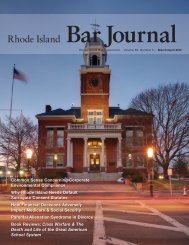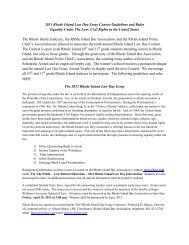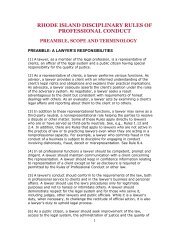Are We Taking The Sex Offender Label Too Far? - Rhode Island Bar ...
Are We Taking The Sex Offender Label Too Far? - Rhode Island Bar ...
Are We Taking The Sex Offender Label Too Far? - Rhode Island Bar ...
You also want an ePaper? Increase the reach of your titles
YUMPU automatically turns print PDFs into web optimized ePapers that Google loves.
<strong>The</strong> reality of sex offenders, sex<br />
offenses and sex offender registration<br />
in the U.S.<br />
<strong>The</strong> reality of sex offenders and their<br />
offenses has been drastically distorted in<br />
the media. Society has been frightened<br />
with tales of sex offenders who are constantly<br />
re-offending. Yet recidivism rates<br />
for sex offenders are far lower than<br />
recidivism rates for non-sex offenders.<br />
According to the most recent recidivism<br />
rates collected by the U.S. Department<br />
of Justice, 43% of sex offenders in state<br />
prisons were re-arrested within three<br />
years of release from incarceration, compared<br />
to 69.5% of non-sex offenders. As<br />
for re-convictions, sex offenders had a<br />
24.8% recidivism rate, whereas non-sex<br />
offenders came in at 48.9%. 19 Some<br />
researchers have found that recidivism<br />
rates are actually higher for registered<br />
sex offenders than for unregistered sex<br />
offenders. 20 Others have found no statistically<br />
significant difference between the<br />
recidivism rates for registered sex offenders<br />
and unregistered sex offenders. 21<br />
More importantly, 95-96% of sex<br />
offenders arrested have no prior sex<br />
offense convictions. <strong>The</strong>refore, there<br />
seems to be no effective way to predict<br />
who, or when someone, will commit a<br />
sex offense. 22<br />
<strong>The</strong> public perception of the typical<br />
sex offender is the scary man lurking in<br />
the bushes or luring children into cars<br />
with candy. <strong>The</strong> reality is that 97% of<br />
child sex abuse victims up to 5 years old<br />
knew the offender (as a family member,<br />
family friend) prior to the offense. For<br />
those victims 6-11 years old, 95% knew<br />
the offender previously. For those 12-17<br />
years old, the statistic is 90%. In general,<br />
for sexual assault victims under 18 years<br />
of age, 93% knew their offender before<br />
the incident. 23 <strong>The</strong> same study also found<br />
that over 72% of adult victims knew<br />
their offender prior to the incident. 24<br />
Up until now, sex offender registration<br />
and community notification laws have<br />
created significant negative implications<br />
for offenders. More stringent registration<br />
requirements, including longer registration<br />
periods, will lead to even more difficulty<br />
finding employment, housing and<br />
stable social connections, and will make<br />
it more likely that sex offenders will be<br />
harassed and/or assaulted. 25 In some cases,<br />
these excessively stringent registration<br />
requirements have encouraged sex offenders<br />
to re-offend because they are left with<br />
little to no incentive to rehabilitate. 26<br />
Constitutional, fiscal and societal<br />
defects of the AWA<br />
1. <strong>The</strong> AWA is unconstitutional on<br />
several grounds<br />
Last summer, the Supreme Court of<br />
Ohio 27 ruled that the AWA violated the<br />
separation of powers doctrine. <strong>The</strong> Court<br />
found that the executive branch was<br />
unconstitutionally allowed to open final<br />
judgments of the Superior Court in order<br />
to re-classify sex offenders. 28 <strong>The</strong> same<br />
problem will occur in this state. Under<br />
the proposed AWA, the executive branch<br />
will be allowed to vacate judgments from<br />
the Superior Court and re-classify those<br />
sex offenders. Such tampering with final<br />
orders of the court is unconstitutional<br />
and violates separation of powers.<br />
<strong>The</strong> AWA would most certainly also<br />
deprive offenders of their procedural due<br />
process rights to a meaningful hearing<br />
before being labeled a sex offender. An<br />
essential element of one’s due process<br />
rights is the opportunity to be heard “at<br />
a meaningful time and in a meaningful<br />
manner.” 29 As noted previously, in 2009,<br />
the <strong>Rhode</strong> <strong>Island</strong> Supreme Court considered<br />
the current registration and community<br />
notification system in State v.<br />
Germane. 30 In their decision, our<br />
Supreme Court found that sex offenders<br />
<strong>Rhode</strong> <strong>Island</strong> <strong>Bar</strong> Journal November/December 2011 19
















